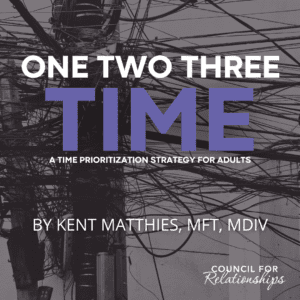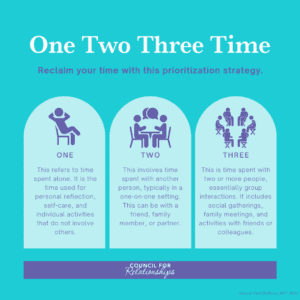One Two Three Time: A Time Prioritization Strategy for Adults
In the hustle of modern life, understanding and managing personal time is critical to enhancing well-being. In fact, a recent survey found that when rating on a scale of 1-10, where 10 signifies a great deal of stress, a quarter of all Americans reported their average stress level as between 8 and 10. The concept of One Two There Time provides a unique framework for balancing solitude, companionship, and community engagement, tailored to individual preferences and needs.
As we delve deeper into the nuances of One Two Three Time, we explore its role in personal development and emotional health. Whether navigating the dynamics of introversion and extroversion, managing relationship dynamics, or simply seeking to refine your understanding of personal and social time, the insights shared here empower you to take back your personal time.
 Therapy Goats on the Chesapeake?
Therapy Goats on the Chesapeake?
Working with a therapist can help a person implement helpful strategies for improving the quality of their life.
I learned one such strategy, One Two Three Time, from a friend living alone on a goat farm. Actually, Johnny wasn’t living alone if goats count. I have always been a guy living in the city or suburbs. Hence, when I met John, I took note of his remote abode.
“Do you ever get lonely out here?” I asked, in a mediocre attempt to hide the projection of my own loneliness challenges.
“No, I need and love time alone,” John said, “I learned a long time ago that everyone has different wants and needs for their One Two Three Time.”
Understanding One Two Three Time: A Unique Approach to Balancing Personal Needs
Johnny explained to me One Two Three Time highlights that everyone has different wants and needs for alone time, time with another person, and time with two or more other people (that is, group time).
One Two Three Time is a strategy that balances different types of social interaction and personal solitude based on individual needs and preferences. It categorizes time into three distinct types:
- One Time: This refers to time spent alone. This involves time used for personal reflection, self-care, and individual activities that do not involve others. It is essential for those who recharge and find peace in solitude.
- Two Time: This involves time spent with another person, typically in a one-on-one setting. This can be with a friend, family member, or partner. It’s used for more intimate social interactions and can be crucial for building and maintaining close relationships.
- Three Time: This is time spent with two or more people, essentially group interactions. It includes social gatherings, family meetings, and activities with friends or colleagues. It’s important for those who thrive in lively social environments and benefit from the dynamics of group interactions.
The strategy reminds us that everyone has different needs and preferences when it comes to spending time. Understanding and balancing these priorities can improve mental health and overall life satisfaction.
The Role of Therapists in Personalizing Your Time Prioritization
Working with a therapist can help you best navigate your own wants and needs for One Two Three Time. Therapists can help you navigate your preferences to maximize your personal and relational fulfillment.
Johnny, who earned his living by getting up at 4:30 a.m. and managing crab pots on the waters of the Chesapeake Bay, was energized by the structure of his life. That knowledge had not come easily to Johnny, who had spent years in alcohol recovery programs, was active in his church, and worked with a therapist.
Extroverts and Introverts: Managing One Two Three Time According to Your Personality
Generally speaking, introverts want and need more time alone and with another person, while extroverts want and need more time with another person and a larger group.
But guess what?
Most people do not remain fixed throughout their lives at the same point along the introvert-extrovert spectrum. It is also true that in wider society, many extrovert traits are favored due to inaccurate and unwise societal biases. Introverts’ traits are often unfairly painted in a negative light. Whether you get your batteries charged more by alone time or spending time with others, you might benefit from a therapist helping you navigate.

Infographic by Council for Relationships
Navigating Relationships with One Two Three Time: Insights from a Relationship Therapist
It is a well-known adage that good communication is important for relationships. The trick often involves the partners figuring out what to communicate.
One Two Three Time is a productive frame for couples to focus their conversation. A relationship therapist (sometimes called a “couples therapist”) can assist.
Communication and One Two Three Time: Strengthening Emotional Health
As we move through the chapters of our lives, our needs and wants for how we spend our time often change. For example, you may have been single and become comfortable living alone. Then you found your mate and moved in together. Wow! Regardless of the energizing or challenging aspects of your relationship, you now have significantly more Two time (that is, time at home with your partner[s]).
Without getting defensive or judgmental, can you and those in your relationship make space to share and listen to each other’s wants and needs for One Two Three Time? Perhaps independent of any qualities of your romantic relationship, one of you would appreciate more alone time. Alternatively, one of you may crave increased hangout time with a group of friends.
When those in relationships explore these questions together, including with the support of a therapist, they can live into the wisdom found in the words of the poet Kahlil Gibran: “Love one another, but make not a bond of love: Let it rather be a moving sea between the shores of your souls.”
Life’s Evolving Needs and One Two Three Time: Adapting Through the Stages
In the later stages of life, folks face new challenges and opportunities to engage in One Two Three Time. When the kids launch into adulthood, and a couple lives in an empty nest, grieving often combines with undertaking long put-aside hobbies, friendships, or health needs.
When a partner has health challenges and increasingly stays home, the other partner(s) may benefit from clarifying they still have wanderlust. A relationship therapist can help a couple negotiate how to support a partner nesting while the other gets out to expand and explore.
If any of these situations or others resonate, maybe, a therapist can help you explore how your attachment style is at play. Do you have an avoidant, anxious, or secure attachment style? A therapist may also be able to help you assess how you process uncertainty and change. How do you develop more tools for growing a healthy window of tolerance for stress?
We liked to say that before COVID-19, everyone could benefit from talking to a therapist now and then. After COVID-19, everyone can benefit from talking to a therapist now and then. Why not give yourself some support? Maybe this work can help you better navigate how you can best be yourself, both when you are alone and when you are with others.
About Council for Relationships
Let CFR’s over 85 individual, couples, and family therapy experts help you build thriving relationships and flourishing communities. See our Therapist & Psychiatrist Directory for CFR therapists or psychiatrists near you.
If this is an emergency, please call 911 or contact the National Suicide Prevention Lifeline by dialing 988.
More Mental Health Blogs
Our expert therapists, psychologists, and psychiatrists offer much more to explore! Check out the CFR Expert Voices blog for great mental and emotional health advice and insight. To get first access to our Expert Voices blog, join our mailing list!
Philadelphia Psychiatrist and Therapist Encourages Embracing Diverse Emotions
Are you building the life you want as 2023 transitions into 2024?
